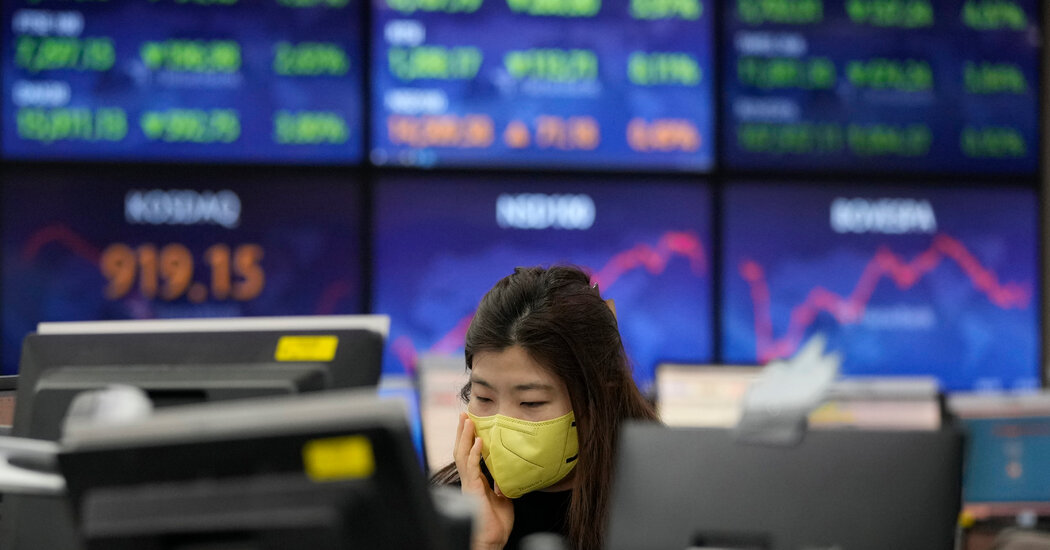
The “Mean Girls” tour made it to Oklahoma before it was knocked out by the coronavirus. At first, the production had been able to keep going by flying in alumni from its Broadway run, but ultimately the number of company members testing positive was just too high, so earlier this month the show decided to cancel its remaining shows in Tulsa, and then postponed the runs that would have followed in two Wisconsin cities, Madison and Appleton.
When the show hit the pause button, Jonalyn Saxer, the actress playing Karen Smith, found herself with two weeks off and no home of her own — like many actors, she gave up her New York apartment and put her stuff in storage when she signed on to tour. The show offered to fly her wherever she wanted to go, and she chose her parents’ house in Los Angeles.
“I was home over Christmas, and when I left I said, ‘I don’t know when I’ll be back,’ ” she said. “Two weeks later, I was like, ‘Hi Mom and Dad!’”
The lucrative touring market for Broadway shows is being jolted by the Omicron surge, as coronavirus cases increase in parts of the country even as they have begun to fall in the nation as a whole.
This past weekend, productions of “Harry Potter and the Cursed Child” in San Francisco and “The Prom” in Baltimore were canceled because of positive tests in their companies.
“Hamilton” has been particularly hard hit: This month it halted all four of its American touring productions, in Buffalo, Los Angeles, Salt Lake City and San Antonio, because of positive coronavirus tests.
The phenomenon is in some ways similar to what happened on Broadway, where so many theater workers tested positive in December that half of all shows canceled performances on some nights. But there is a key difference: Whereas on Broadway, there has also been a damaging drop in ticket sales, elsewhere in the country, producers say, attendance has generally remained steady.
“Touring, when we can perform, is going great — the audiences are showing up, and the audiences are enthusiastic,” said Jeffrey Seller, the lead producer of “Hamilton.” “Touring is not going great when Covid sweeps through our company, which has happened to every one of our tours.”
For actors, touring now involves less sightseeing, and more risk management, than it once did.
“It’s the highest of highs, because we’ve been waiting for a year and a half to be back doing what we love to do, but it’s not the same,” said Saxer, who tested positive for the virus in November when her tour was in Spokane, Wash., and recovered while quarantining there.
“It’s not like we can say ‘Let’s go check out this cool bar,’ because actors all around are losing their jobs because someone tests positive,” she added. “It does raise the stakes.”
Christine Toy Johnson, an actor in the “Come From Away” tour, said she had not eaten inside a restaurant since July.
“In some cities, we’re in hotels and we’re the only people wearing masks,” she said. “It’s very stressful — I’m not going to lie. But it’s also been an exciting time to be back in the theater, making art again.”
There are currently about three dozen shows moving from venue to venue, stopping at a mix of nonprofit performing arts centers and for-profit theaters in nearly 300 North American cities, according to Meredith Blair, the president and chief executive of the Booking Group, an agency that arranges touring shows. The shows bring in a lot of money: those featuring union actors (there are also tours with nonunion casts) grossed $1.6 billion at the box office in 2018-2019, which was the last full season before the pandemic; that’s just slightly less than the $1.8 billion spent by theatergoers attending Broadway shows in New York City during the same period, according to the Broadway League.
There appear to be several reasons the touring audience has remained more stable than the Broadway audience. Most of the venues that present touring productions depend on locals, rather than visitors, so they are less vulnerable to the drop in tourism that has walloped Broadway. Many of the touring venues have large numbers of subscribers who, remarkably, retained their subscriptions throughout the pandemic. And some venues are in parts of the country where residents have been less inclined to make changes to their routines because of Covid.
“There’s a huge difference between New York and the audience on the road,” said Rich Jaffe, a co-chief executive of Broadway Across America, which presents Broadway tours in 48 North American markets. “On the road, they consider these venues their theaters — it’s a big part of their communities, supporting jobs and creating economic ripple effects for local downtowns that are quite significant. If we have a show, the audience is there.”
Many North American tours are bypassing Canada because of government-mandated capacity restrictions there. But in the United States, where there are generally no capacity limits, venue operators seem pleased with how things are going, despite the bumpiness of Omicron.
“We’ve already presented five weeks of touring Broadway, and we’ve had great attendance — our audiences are showing up enthusiastically,” said Joan H. Squires, the president of Omaha Performing Arts, which hosted touring productions of “Cats” and “Hamilton” in the fall and then “Dear Evan Hansen” in the days before and after the New Year’s holiday. Squires wound up scanning tickets at the door for “Dear Evan Hansen” because too few volunteer ushers were available, but she attributed that more to winter weather than Covid concerns.
The biggest brand names, as always, are selling the strongest. And “Hadestown,” which won the Tony Award for best musical in 2019 and began its tour in October, is starting strong. “‘Hadestown’ arrived just as we were starting to see Omicron spike, and it far exceeded our targets for attendance and sales,” said Maria Van Laanen, the president and chief executive of Fox Cities Performing Arts Center in Appleton.
Presenters in some cities describe a softening of sales as Omicron hit. “We certainly noticed a slower pattern of buying over the holidays — in any other year, we would have been completely sold out, but that obviously wasn’t the case because there was some hesitancy,” said Jeffrey Finn, the vice president of theater producing and programming at the John F. Kennedy Center for the Performing Arts in Washington. “That said, I’m watching a big upturn as we head toward the spring with the hope and expectation that Omicron won’t be as present.”
Safety precautions vary across the country. Most shows are requiring that audiences wear masks, except in cities where such requirements are barred; vaccination rules for audiences follow local government protocols (actors and other theater workers are required to be vaccinated).
Keeping tours going has required shows to add staff members. “Hamilton” now employs seven “universal swings,” who are versatile performers ready to travel anywhere they are needed to fill in, up from four before the pandemic; “The Lion King” has brought in three additional swings.
“Come From Away” offers a particularly vivid case study in the creativity also required to keep shows afloat. The company got hit by Covid earlier this month as it arrived in Minneapolis, where it was scheduled to spend two weeks.
“We went 15 weeks without any problems, but then Omicron came and started to wreak havoc,” said Johnson, who has been with the tour since 2018. “At one point half the cast was sidelined.”
The producers canceled three performances, which bought them enough time to bring in actors from California, New York and Toronto, and the show then resumed with a blended cast that included alumni not only from Broadway but also from productions in Australia, Canada and Britain.
“It’s the never-ending Rubik’s Cube of trying to keep a show up and running,” said Sue Frost, a lead producer of “Come From Away.”
Among those who flew in was Happy McPartlin, a standby in the Broadway cast, who had just recovered from her own case of Covid. “I said, ‘Of course,’ because that’s what we do here,” she said. “I knew the state we were in. We had a couple of bad weeks where the numbers were not in our favor, and one of the people from the tour came in and saved us. I said, ‘If you guys need me, I’ll do the same for you.’”
Not all of the cancellations have been short-lived. In December, “Ain’t Too Proud” canceled two weeks in Washington; “The Lion King” missed 12 performances in Denver, while “Wicked” canceled six performances in Cleveland. “Hamilton” shut down for a month in Los Angeles, and upon its reopening next month, it is now scheduled to stay just six more weeks, rather than running into the spring as initially anticipated.
“I almost forgot about Covid for a little bit because we got so used to it, and it was so much fun to do the show, but then Christmas Eve we had so many positive tests we couldn’t do the show, and we canceled a half-hour after it was supposed to start,” said Nicholas Christopher, who plays Aaron Burr in the Los Angeles production of “Hamilton.” Christopher had moved from New York to Los Angeles for “Hamilton”; he, his wife, and their new baby all tested positive in December, and then he found out the show’s Los Angeles run was ending.
“It’s very eye-opening, and very humbling, and makes me appreciate what we do even more, because it’s been taken away so many times,” he said. “It’s almost like PTSD, having the show be shut down again. It still feels like a dream that I’m ready to wake up from.”







